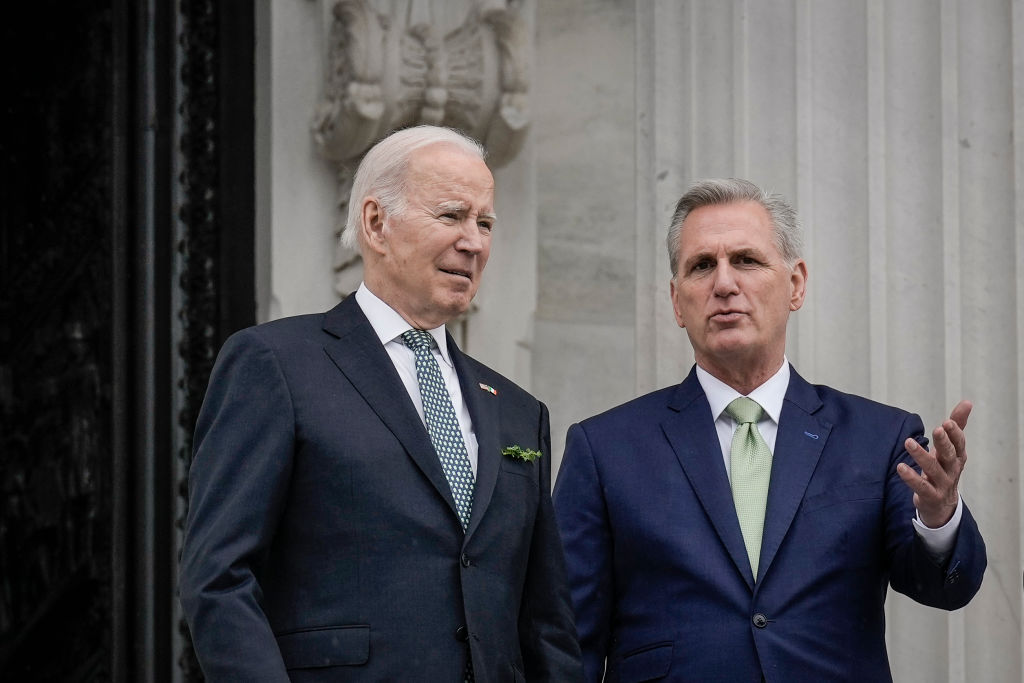For years, anyone who has had a peanut gallery or front-row seat in the political theater during the debt ceiling drama knew that President Joe Biden and the House Republican leadership would come together at the last minute and strike a deal. It might not have been a terrific agreement for the current and future generations of taxpayers, but it was something to avert a meltdown in the global financial markets ostensibly. During the Memorial Day weekend, Biden and House Speaker Kevin McCarthy (R-CA) announced they had reached a deal in principle over the 99-page Fiscal Responsibility Act. What is inside? For Republican leaders, it was the greatest thing since sliced bread. For conservative members of the GOP caucus, this was the greatest joke since George Carlin’s bit about the seven things you cannot say on television – words that many lawmakers probably wanted to utter during the Sunday talk show circuit.
Inside the Debt Ceiling Deal
The biggest headline from the weekend drama was that Republicans capitulated by agreeing to raise the debt limit by $4 trillion in addition to the current $31.4 trillion national debt. The agreement suspends the debt limit through January 2025, removing it as a critical issue during the 2024 presidential election. With such a sizable increase, this must have meant that the Speaker of the House and his negotiators secured most of the provisions inside the Limit, Save, Grow Act passed in April. Based on the reaction by a chorus of Republican lawmakers, many conservatives think McCarthy failed to gain much after the months-long showdown.
Non-defense spending would be roughly flat in fiscal year 2024 at about $637 billion and then increase by 1% in fiscal year 2025. In 2026 and beyond, there would be no budget caps. Non-defense discretionary spending would be rolled back to FY 2022 levels, and topline federal spending would be limited to 1% annual growth for the next six years. Moreover, the deal would see a 3.5% boost to Defense spending, with the Pentagon receiving $886 billion. The package also includes $121 billion for veterans’ health care.
Despite the April bill that slashed $70 billion from the Internal Revenue Service (IRS), the Fiscal Responsibility Act repurposes $20 billion from the IRS over two years for non-defense spending.
Officials rescinded $30 billion in unobligated funds from the COVID-19 relief packages. However, Washington would keep $5 billion in funding to bolster the development of COVID vaccines and treatments and funding for uninsured individuals who receive vaccines and treatments.

(Photo by Drew Angerer/Getty Images)
In what might drive a wedge between the administration and progressive lawmakers, the deal installs tighter work requirements for adults up to the age of 54 without children receiving Supplemental Nutrition Assistance Program, also known as food stamps. It also includes time limits and expanded exemptions for veterans, the homeless, and former foster youth.
Speaking to reporters on May 28, President Biden called it “a really important step forward” as it removes “the threat of catastrophic default off the table.” He added: “And the agreement also represents a compromise, which means no one got everything they want. But that’s the responsibility of governing,” the president said. “This is a deal that’s good news for, I believe you’ll see, for the American people.
“The Fiscal Responsibility Act does what is responsible for our kids, what is possible in divided government, & what is required by our principles. Republican resolve achieved this transformative change to how Washington works,” the House Speaker said in a statement.
Are the Votes There?
The finalized legislative text will head to the lower chamber on May 30 for a vote. Will it pass after one attempt?
President Biden thinks McCarthy has the votes, and the House Speaker told reporters on Capitol Hill that “a majority of Republicans” will vote for the “strong bill.” But a growing number of Republicans have taken to Twitter to express dismay over the legislation.
Rep. Ken Buck (R-CO) called it a “surrender” and “completely unacceptable” after agreeing to raise the debt limit to $35 trillion, adding that this was a win for the Democrats. Rep. Bob Good (R-VA) stated it would be hard for any conservative to “justify a yes vote.” Finally, Rep. Chip Roy (R-TX) admitted that “it’s worse than I thought every minute that goes by.”
“Our base didn’t volunteer, door knock, and fight so hard to get us the majority for this kind of compromise deal with Joe Biden,” tweeted Rep. Lauren Boebert (R-CO). “Our voters deserve better than this. We work for them.”
 Not all Democrats appear to be on board, including the progressive bloc of lawmakers, with some thinking President Biden made too many concessions. House Minority Leader Hakeem Jeffries (D-NY) was not ready to commit to having all Democrats support the bill. Rep. Pramila Jayapal (D-WA) warned that the White House might need to be concerned about insufficient support from progressives. However, Sen. Chris Coons (D-DE) urged anyone who has a modicum of consternation surrounding the legislation “to come together” because the deal “is far better than defaulting.”
Not all Democrats appear to be on board, including the progressive bloc of lawmakers, with some thinking President Biden made too many concessions. House Minority Leader Hakeem Jeffries (D-NY) was not ready to commit to having all Democrats support the bill. Rep. Pramila Jayapal (D-WA) warned that the White House might need to be concerned about insufficient support from progressives. However, Sen. Chris Coons (D-DE) urged anyone who has a modicum of consternation surrounding the legislation “to come together” because the deal “is far better than defaulting.”
Flawless Victory?
Liberty Nation’s Mark Angelides recently wrote, “It is becoming increasingly clear that both McCarthy and Biden need to be seen as the winner in the debt limit battle; the former to retain his position in the House and the latter to rally his party for the 2024 presidential election.”
Indeed, based on the statements over the past 48 hours, Biden and McCarthy behave as if they had resolved the country’s debt fiascos over a slice of pizza and a can of Coca-Cola. But many fiscal conservatives feel upset that McCarthy failed to achieve anything substantive. After watching several debt ceiling debates, it seems conservative voters think the GOP has routinely fallen short of capturing victories that would significantly alter the nation’s unsustainable fiscal path. By 2030. the Biden budget forecasts US base discretionary spending to be about $1.9 trillion. The McCarthy plan? A little more than $1.6 trillion. In today’s fiscal calamity, $300 billion would not cover America’s annual interest payments.
So, the American people may want to mark May 30 on their calendar to determine if McCarthy is leading a united Republican front or if there is a sequel to the 2023 debt ceiling drama coming soon to the political theater.



